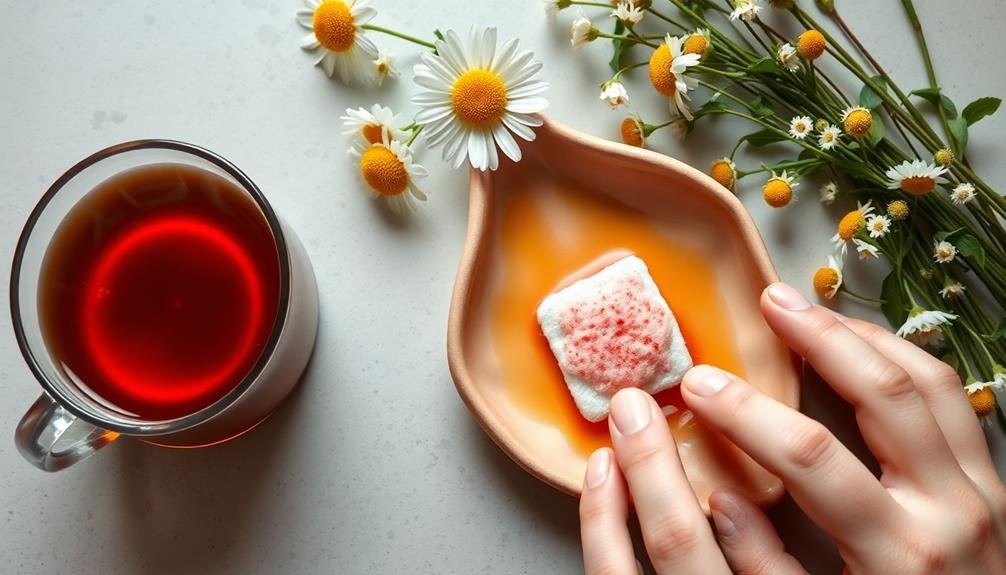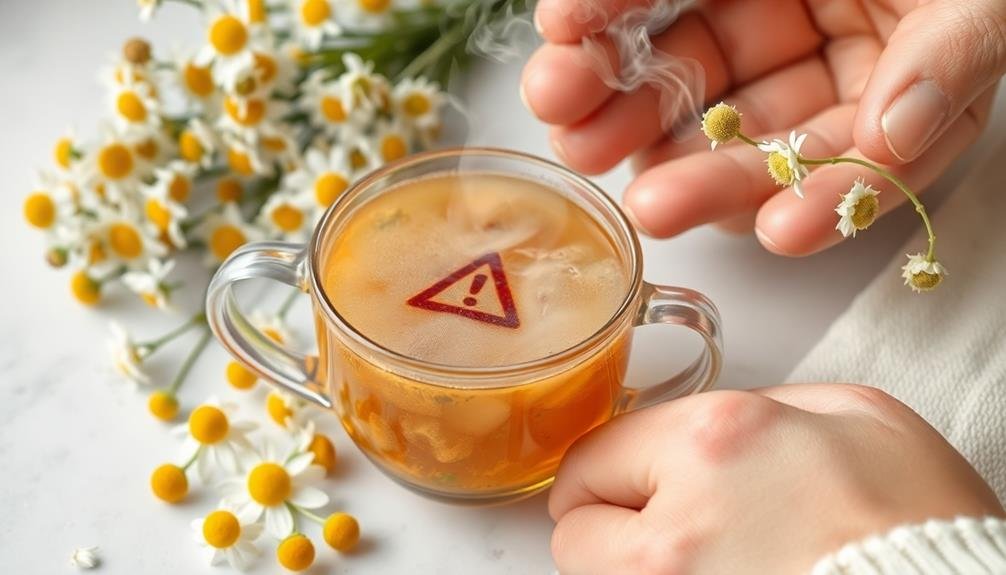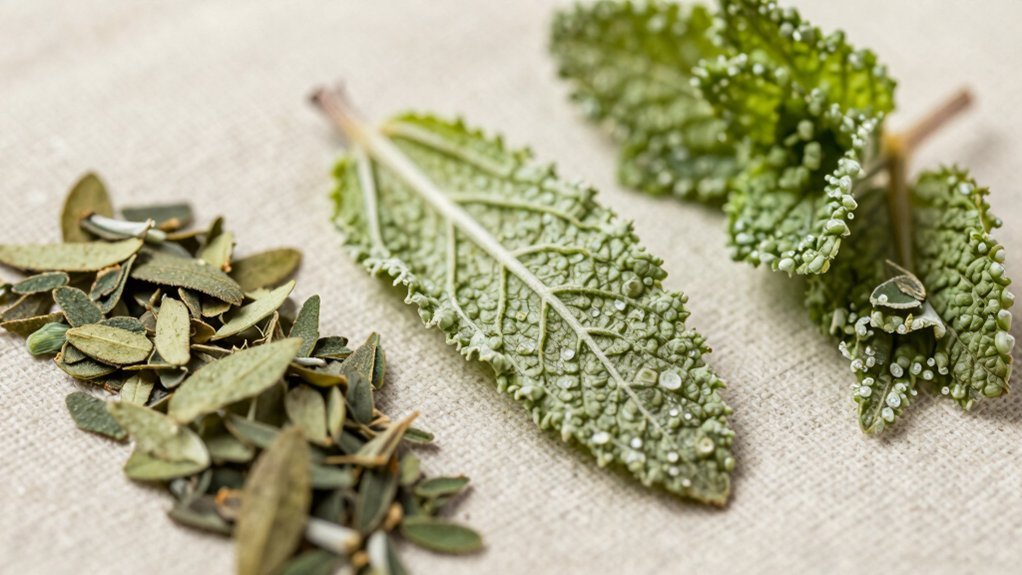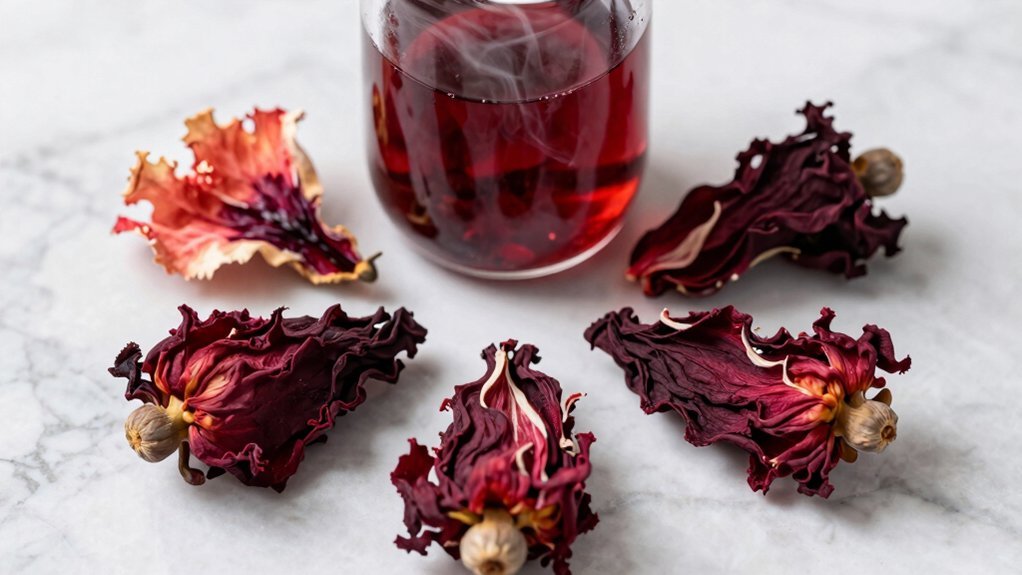Herbal tea can naturally ease your eczema by harnessing the power of anti-inflammatory and skin-soothing compounds. Many herbs, like chamomile and green tea, contain properties that reduce redness, itching, and inflammation associated with eczema. These teas also support overall skin health by enhancing hydration and strengthening your skin barrier. Additionally, stress-reducing herbal blends can help manage eczema flare-ups triggered by anxiety. You can enjoy these benefits by drinking herbal teas or applying them topically as compresses. By incorporating a daily herbal tea routine, you're taking a holistic approach to managing your eczema symptoms. Discover which herbs and preparation methods work best for your unique skin needs.
Understanding Eczema and Its Triggers

One of the most frustrating skin conditions, eczema affects millions worldwide. If you're among those struggling with this chronic ailment, you're likely familiar with its hallmark symptoms: red, itchy, and inflamed skin that can appear anywhere on your body.
Eczema, also known as atopic dermatitis, occurs when your skin's protective barrier is compromised, making it more susceptible to irritants and allergens.
Understanding your eczema triggers is essential for managing the condition. Common culprits include environmental factors like extreme temperatures, low humidity, and exposure to harsh chemicals.
Certain fabrics, such as wool or synthetic materials, can also irritate your skin. Stress, hormonal changes, and food allergies may exacerbate symptoms for some individuals.
Additionally, products containing fragrances, dyes, or preservatives can trigger flare-ups.
Herbal Teas With Anti-Inflammatory Properties
While managing eczema triggers is important, incorporating anti-inflammatory remedies into your routine can help soothe irritated skin. Herbal teas offer a natural way to combat inflammation from within.
Chamomile tea, renowned for its calming properties, contains compounds that reduce redness and itching. You can drink it or apply cooled tea bags directly to affected areas for relief.
Green tea is another powerful ally, packed with antioxidants that fight inflammation and promote skin healing. Its catechins help protect your skin from damage and may reduce eczema flare-ups.
Rooibos tea, rich in flavonoids, can help strengthen your skin barrier and alleviate dryness.
Turmeric tea, with its active compound curcumin, offers potent anti-inflammatory benefits. It can help reduce eczema symptoms and support overall skin health.
Ginger tea, known for its warming properties, also possesses anti-inflammatory effects that may ease skin irritation.
When incorporating these teas into your routine, aim for 2-3 cups daily. Remember, consistency is key to seeing results.
While herbal teas can be beneficial, they're not a substitute for medical treatment. Always consult your healthcare provider before making significant changes to your eczema management plan.
Detoxifying Teas for Skin Health

Radiance often begins from within, and detoxifying teas can play an essential role in promoting skin health. These teas help cleanse your body of toxins that may contribute to skin conditions like eczema. By incorporating detoxifying teas into your daily routine, you're supporting your body's natural detoxification processes and potentially improving your skin's appearance.
Dandelion root tea is a powerful detoxifier that supports liver function, helping to eliminate toxins more efficiently. It's also rich in antioxidants, which can protect your skin from free radical damage.
Green tea is another excellent choice, packed with catechins that boost your metabolism and aid in toxin removal.
Milk thistle tea is renowned for its liver-supporting properties, helping to cleanse your blood and potentially reduce eczema flare-ups.
Burdock root tea is a traditional detoxifier that may help clear up skin conditions by purifying your blood and promoting healthy liver function.
When drinking detoxifying teas, remember to stay hydrated and listen to your body. Start with one cup daily and gradually increase if you feel comfortable.
Combining these teas with a balanced diet and proper skincare routine can enhance their skin-health benefits.
Stress-Reducing Herbal Tea Blends
Stress can considerably exacerbate eczema symptoms, making stress management a key component of skin health. Herbal teas offer a natural way to reduce stress and potentially alleviate eczema flare-ups. You'll find several stress-reducing herbal tea blends that can help calm your mind and body.
Chamomile tea is renowned for its soothing properties. It contains apigenin, an antioxidant that promotes relaxation and may improve sleep quality.
Lavender tea is another excellent choice, known for its calming effects and ability to reduce anxiety. You can also try passionflower tea, which has been shown to lower cortisol levels and promote a sense of tranquility.
For a more potent stress-reducing blend, consider combining herbs like lemon balm, holy basil, and ashwagandha. Lemon balm helps reduce stress and anxiety, while holy basil acts as an adaptogen, helping your body cope with stress.
Ashwagandha is known for its ability to lower cortisol levels and promote overall well-being.
When brewing these teas, steep them for 5-10 minutes to extract the maximum benefits. Drink them regularly, especially during times of increased stress, to help manage your eczema symptoms naturally.
Topical Applications of Herbal Tea

Beyond drinking herbal teas, you can also apply them topically to soothe eczema-prone skin. Cooled herbal tea compresses can provide immediate relief from itching and inflammation. Simply steep your chosen tea, let it cool, and apply it to affected areas using a clean cloth or cotton pad.
You'll find chamomile particularly effective for its anti-inflammatory properties. Steep a strong brew, then use it as a gentle wash or compress. Green tea's antioxidants can help repair skin damage and reduce redness when applied topically.
For a soothing bath, add several cups of cooled herbal tea to your bathwater. Don't overlook the benefits of herbal tea in DIY skincare products. Mix cooled tea with natural ingredients like oatmeal or honey to create a nourishing face mask. You can also use herbal teas as a base for homemade lotions or creams, enhancing their skin-soothing properties.
Remember to patch test any new topical application, as some people may be sensitive to certain herbs. If you experience any adverse reactions, discontinue use immediately and consult your healthcare provider.
With consistent use, topical applications of herbal tea can complement your internal consumption, providing extensive relief for eczema symptoms.
Creating Your Eczema-Fighting Tea Routine
To create an effective eczema-fighting tea routine, you'll need to start by choosing the right herbs for your specific symptoms.
Once you've selected your herbs, focus on brewing techniques that maximize their beneficial properties, such as steeping for the correct duration and at the proper temperature.
Choose the Right Herbs
When creating your eczema-fighting tea routine, selecting the right herbs is essential. Focus on herbs known for their anti-inflammatory and skin-soothing properties. Chamomile is a top choice, offering calming effects and reducing redness.
Calendula, with its healing properties, can help repair damaged skin. Licorice root is another powerful option, as it contains compounds that may reduce inflammation and itching.
Don't overlook the benefits of nettle leaf, which can help balance your immune system and reduce allergic reactions. Peppermint has a cooling effect that can soothe irritated skin, while also providing a revitalizing flavor.
For added antioxidant power, consider incorporating green tea into your routine.
When choosing herbs, opt for organic varieties to avoid potential pesticide residues that could further irritate your skin. You can experiment with single-herb teas or create custom blends to suit your taste and needs.
Start with small amounts of each herb and gradually increase as you gauge your body's response. Remember, consistency is key – drink your chosen herbal tea regularly to experience the full benefits for your eczema.
Brewing for Maximum Benefits
Now that you've selected the right herbs, it's time to focus on brewing techniques that enhance their benefits for your eczema. Start by using fresh, filtered water to guarantee no impurities interfere with the herbs' properties.
Bring the water to a boil, then let it cool for a minute before pouring it over your herbs. This prevents scorching, which can alter the tea's therapeutic effects.
Steep your tea for the appropriate time, typically 5-10 minutes for most herbs. Longer steeping times can extract more beneficial compounds but may result in a bitter taste.
Cover your cup while steeping to prevent the volatile oils from escaping. After steeping, strain the herbs and compost them.
For a stronger infusion, try a cold brew method. Add herbs to room temperature water and refrigerate overnight. This gentle extraction process can yield a potent, smooth-tasting tea.
Alternatively, create a sun tea by placing herbs in water and leaving them in direct sunlight for several hours.
Drink your tea warm or at room temperature for ideal absorption. Aim for 2-3 cups daily, spacing them throughout the day to maintain a consistent intake of eczema-fighting compounds.
Consistency Is Key
Establishing a consistent herbal tea routine is essential for managing your eczema effectively. To reap the full benefits, aim to drink your chosen herbal tea at least once daily, preferably at the same time each day. This consistency allows the anti-inflammatory and soothing properties of the herbs to build up in your system over time.
Create a schedule that works for you, whether it's a cup with breakfast, during your afternoon break, or as part of your bedtime ritual. Set reminders on your phone or place your tea supplies in a visible spot to help you remember.
Don't be discouraged if you don't see immediate results; it can take several weeks of regular consumption for noticeable improvements.
Track your progress by keeping a journal of your eczema symptoms and tea intake. This will help you identify which herbs work best for your skin and allow you to adjust your routine as needed.
Precautions and Potential Side Effects

Although herbal teas can offer relief for eczema symptoms, it's important to be aware of potential risks and side effects. While generally safe, some herbal teas may interact with medications or cause adverse reactions in certain individuals. Always consult your healthcare provider before incorporating new herbal remedies into your routine, especially if you're pregnant, nursing, or have underlying health conditions.
Be mindful of possible allergic reactions. If you're allergic to plants in the same family as the herbal tea you're considering, avoid it. Start with small amounts to test your body's response, and discontinue use if you experience any negative effects.
Here's a quick reference guide for common herbal teas and their potential side effects:
| Herbal Tea | Potential Side Effects |
|---|---|
| Chamomile | Drowsiness, allergic reactions |
| Licorice | High blood pressure, low potassium |
| Peppermint | Heartburn, allergic reactions |
| Green tea | Caffeine-related jitters, insomnia |
| Dandelion | Increased urination, allergic reactions |
Frequently Asked Questions
Can Children With Eczema Safely Drink Herbal Teas?
You can give children with eczema certain herbal teas, but it's essential to consult their pediatrician first. Some teas may be safe and beneficial, while others could cause allergic reactions or interact with medications. Always start with small amounts.
How Long Does It Take to See Results From Drinking Herbal Tea?
You'll typically notice results from drinking herbal tea within 2-4 weeks. However, it's important to remember that everyone's body responds differently. Consistent daily consumption is key to experiencing the potential benefits of herbal teas.
Are There Any Herbal Teas That Can Worsen Eczema Symptoms?
While most herbal teas are beneficial, you should be cautious with certain types. Chamomile can trigger allergic reactions in some people, and caffeinated teas like black or green tea might exacerbate eczema symptoms due to their dehydrating effects.
Can Herbal Teas Be Combined With Prescription Eczema Medications?
You can often combine herbal teas with prescription eczema medications, but it's essential to consult your doctor first. Some herbs might interact with your meds, so don't start any new tea regimen without professional guidance.
Are There Specific Brewing Techniques to Maximize the Benefits for Eczema?
You'll want to steep your herbal tea longer to extract more beneficial compounds. Use hot, not boiling water, and cover while brewing. Try cold infusions for some herbs, and don't add milk, which can reduce effectiveness.
In Summary
You've discovered the soothing power of herbal teas for your eczema. By incorporating anti-inflammatory, detoxifying, and stress-reducing blends into your routine, you're taking a natural approach to managing your symptoms. Don't forget to explore topical applications too. Remember, consistency is key, so stick to your tea regimen. While herbal teas can be beneficial, always consult your doctor before making significant changes to your eczema treatment plan. Stay patient and hydrated on your journey to healthier skin.





Leave a Reply